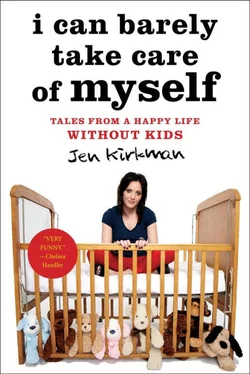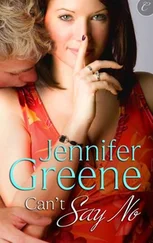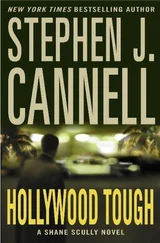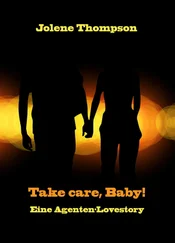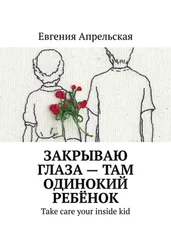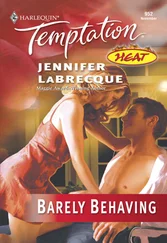Most kids worry that their parents’ divorce was their fault, but in my world, my parents worried that my divorce was their fault. The divorce was nobody’s fault. It was amicable. “Amicable” when used for breakups means: “It’s not really your business and this whole thing sucks but I wasn’t dumped, so don’t pity me.”
After convincing my mom that it wasn’t anything she did that made me no longer want to be married, she finally concluded, “Well, Jen, this is very Hollywood. It’s very hard to stay together in show business. Look at Elizabeth Taylor and Richard Burton. They married, divorced, and then remarried! Their relationship couldn’t take the scrutiny of the public eye.”
“Mom,” I told her, “Matt and I weren’t in the public eye. I’ve never been chased by a paparazzo.” She then consoled me, not about the divorce but about my celebrity standing. “Oh, Jen, you will be there shortly. I always run into people who say that they love watching you on Chelsea Lately. ”
I was sitting in my divorce lawyer’s office, thinking, I have a divorce lawyer. This is something that grown-ups have. Well, not every grown-up, but still. I feel like a war veteran. I have been through some shit that not everyone is strong enough to go through. Some people stay married when they’re not in love. Some people don’t even demand that lots of love exist in their marriage—it’s a partnership, a way to raise kids and join incomes. But hey, I’m not a victim. I’m not a hero. I’m just a grizzled old vet who fought for his country/woman getting a divorce.
Then I caught my grandiose train of thought and abruptly changed gears. Jen, what are you, five years old, thinking that putting a divorce lawyer on a five-thousand-dollar retainer makes you a grown-up? And speaking of retainers, you wear one at age thirty-seven. Where is it? Your orthodontist told you that you have to wear the Invisalign twenty-two hours a day for one year if you ever want to see that incisor on your top row of teeth move or else it will stick straight out just like your grandmother’s. A crooked tooth is fine for her—she lives alone in a nursing home—but you’re about to get out there and have meaningless postmarriage sex with young musicians.
My lawyer took me through the basic questions as he filled out the paperwork for me. Homeowners? No. Age? Thirty-seven. His Age? Thirty-three. Kids? No. Mr. Legal Marriage Ender dropped his pen and looked me in the eye. “No kids?” No. “Did you want kids?” No. “Did he want kids?” No. “Well, if he changes his mind, at least he’s young, right?”
I always wondered whether Matt would change his mind about kids if he weren’t married to me. I know he said he didn’t want kids, and he never had a visible paternal instinct. He cringed even more around babies than he did around cats—and he’s allergic to cats. I always predicted that if I died before Matt, in some kind of tragic stand-up comedy accident on the road—like if too much in-flight Klonopin caused me to trip over my carry-on bag as I shimmied out of my seat toward the bathroom and I used the emergency exit door handle to break my fall, causing me to get sucked out of the plane, where I’d free-fall for a bit and have a heart attack in midair, and my lifeless body would flop to its final resting place in someone’s backyard in Oklahoma—he would remarry a much younger woman who really wanted a baby. She would have family money and neither she nor Matt would ever have to work again, nor would they have to take care of their own child. Matt agreed with my assessment. The only way he could see himself becoming a father would be after my untimely death and his union with a hot twentysomething and her trust fund.
Mr. Legal Marriage Ender said, “Okay. Off the clock.” This was his way of showing me that he was keeping it honest. We were about to talk but it wouldn’t be deducted from my retainer (the money one—not the one on my teeth).
“You really don’t want kids? Are you sure it wasn’t just because you were with the wrong guy?”
“You know,” I told him, “I’m actually writing a book about how I never just get to say, ‘I don’t want kids,’ without a million follow-up questions and now this conversation is going in the book.”
“What if you get pregnant before the book comes out?”
“Then I hope you’ll represent me in the first-ever divorce from a baby.”
NATURALLY, MY FRIENDS were concerned about me after the divorce—not because of the fact that I live in a first-floor apartment in a complex with no doorman and a very chintzy home alarm system, making me the perfect victim of a home invasion by either a roving gang of up-to-no-gooders or an army of superfit, tan L.A. zombies, but because I was now thirty-seven and childfree, even though I’d spent all thirty-seven of those years telling them I didn’t want children.
I was on a flight after a gig once with my comedian friend Ray, who couldn’t wait for the plane to land so that he could get home and give his wife and kids a hug. He said to me, “Jen, you were so sure that Matt was the One—so how can you be sure that you don’t want kids?”
“I wasn’t a hundred percent sure Matt was the One,” I replied. “But I took a leap of faith. Romantic love is not parental, instinctual, unconditional love—it’s complex. And what if I change my mind about having kids and I decide to have one and then I change my mind again ? As gut-wrenching (and expensive) as it is to change your mind about who you love, it’s a hell of a lot easier to get divorced than it is to toss a kid back into the sea and tell them that they’ll meet someone else someday who will really love them.”
Then Ray added the kicker, the go-to asinine comment from parents everywhere who want to induct you into their club of 3:00 a.m. feedings, applying to private pre-preschools, playground concussions, teenage daughter pregnancy scares, and teenage sons who realize one day that they always wanted to be daughters and hit you up for money for their transition surgeries: “I’ll just feel so sad for you if you never know the love of a child.”
To which I said, “Well, I feel sad for you too. You’ll never know what it’s like to fuck a twenty-three-year-old drummer.”
THE FIRST MORNING that I lay in bed without Matt beside me, I decided to go to Starbucks and get a coffee and the New York Times Sunday Styles section, and then get back into bed in my clothes and stay there all morning. And yes! I get up at seven on weekends because I love my free time. Not every childfree person sleeps late and parties all the time. I am still a grown-up. I was happy. It felt right to be in a big bed by myself. I was relieved that I was on my way to no longer being married. I thought of my old coworker Miriam, who used to read the Times every morning in our shared workspace in the basement of the Charles Playhouse in Boston as she balanced a lit Pall Mall cigarette in her mouth.
I revered the way Miriam ashed her cigarette while she counted the one-dollar bills in the cash box. We were box office cashiers, selling tickets to Boston’s original long-running dinner theater show Sheer Madness. I was twenty-two years old, broke, single, and miserable. Miriam was sixty-two years old, broke, single, and fabulous. Not only did I want to be her when I grew up—I wanted to be her at that moment.
Miriam wore a brooch that on any other woman who doesn’t get her period anymore would look musty. She looked fashion-forward. Her nails were painted such a specific shade of retro-red that I’m sure it came from a thirty-year-old bottle of nail polish. She wore a different black dress every day—always a fine wool-cashmere combination, always perfectly tailored. Miriam went to New York City two weekends every month to have dinner with friends and see a Broadway show. She told me that it was easy—just a forty-dollar round-trip bus ride on Greyhound and a very inexpensive stay in a youth hostel. It sounded so glamorous and free-spirited. Years later when I realized you have to share rooms in youth hostels and there are no private bathrooms, I wondered how she possibly could have lived that way. Miriam was the type of woman who, if not obligated by a job sitting behind a card table in a Boston basement every day to make a living wage, would be in a café somewhere just drinking endless cups of black coffee and reading the paper. She had a European sophistication about her, where she could linger leisurely doing one thing at a time, smoking unfiltered cigarettes and apparently not getting cancer.
Читать дальше
